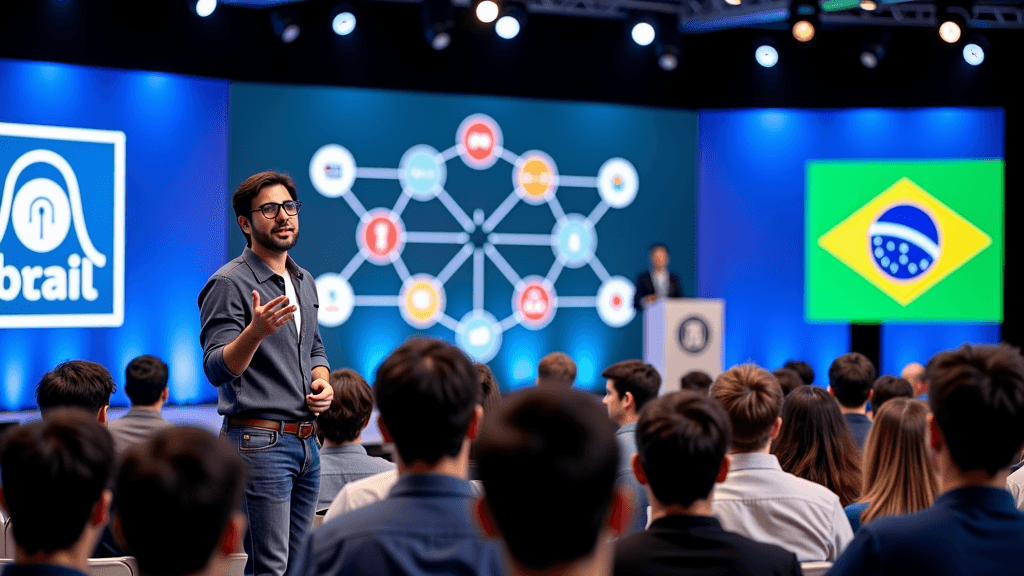AI in Brazil: Between Adult Avatars and Corporate Underutilization – The Innovation Paradox
March 25, 2025 | by Matos AI

The artificial intelligence ecosystem in Brazil reveals a fascinating paradox: while we see innovative cases of application and monetization of technology, many professionals and companies still underutilize its transformative potential. The news of the last 24 hours illustrates this dichotomy and shows how we are at a decisive moment to define what kind of country we will be in the AI revolution.
The phenomenon of virtual avatars and the parallel economy of AI
One of the most talked about topics of the week is the rise of what is being called “job AI” – virtual women created by artificial intelligence to produce adult content on platforms such as OnlyFans and Privacy. The phenomenon, which has already become popular in the USA and Europe, arrived in Brazil in full force in 2025.
According to a report by Digital Look, there are already Brazilians making money not only by creating these avatars, but also by offering courses teaching others how to enter this market. One creator mentioned in the article, Elaine Pasdiora, 35, claims to have earned more than R$20,000 in just three months selling courses on the subject.
Join my WhatsApp groups! Daily updates with the most relevant news in the AI world and a vibrant community!
- AI for Business: focused on business and strategy.
- AI Builders: with a more technical and hands-on approach.
This case illustrates a characteristic that I have observed for years in the Brazilian innovation ecosystem: our ability to adapt quickly to new technologies, especially when they present clear monetization opportunities. However, it also raises important ethical and legal questions about the use of AI.
Ethical issues and lack of regulation
The creation of adult content by AI is part of a broader panorama of ethical challenges associated with the technology. Philosopher Luciano Floridi, a reference in information ethics, identifies four major risks associated with AI, according to a report by LOOK:
- Liability in cases of errors in the use of AI systems
- The effects on our identity and human uniqueness
- The socioeconomic impact and potential use as an instrument of oppression
- The environmental impact due to high energy consumption
At the same time, we see artists and content creators in Hollywood mobilizing to protect their copyrights against unauthorized use by AI systems. More than 400 personalities signed a letter addressed to the American government asking for more effective protections.
In journalism, similar concerns led to the final declaration of the 8th Editors' Congress of the European Union, Latin America and the Caribbean calling for protections for recent journalistic content, proposing a 48-hour period after initial publication in which the content could not be used to train generative AIs, according to the S.Paulo Newspaper.
The Pix Force case: Brazilian AI conquering the world
Amid so many challenging issues, there are reasons for optimism when we see cases like that of Pix Force, a startup from Rio Grande do Sul that has stood out globally with its application of artificial intelligence and computer vision. According to Época Negócios, the company has already won over major clients such as Petrobras and Hitachi, expanding its operations to Europe and the United States.
Pix Force’s success exemplifies what I always advocate in my mentoring sessions and lectures: the potential of Brazilian startups to create innovative solutions with cutting-edge technology. The combination of computer vision and AI to solve complex problems in traditional sectors, such as oil and gas and electricity, shows how the strategic application of technology can generate value and conquer international markets.
The Great Paradox: Record Investment and Limited Use of AI
While big techs plan to collectively invest US$1.4 billion in AI by 2025 (equivalent to 151.3 billion of Brazil's GDP!), according to a report by Business Season, the effective use of technology by workers and companies is still far from its potential.
A report from Economic Value indicates that few professionals are harnessing the potential of generative AI tools, and companies are not doing enough to empower them. This is a problem I have seen closely in my work with startups and corporate innovation.
There is a clear mismatch between investment in technology and people’s preparation to use it. In my mentoring sessions for startups and companies, I often emphasize that digital transformation is not just about acquiring tools, but mainly about developing a culture and mindset that allows you to take advantage of its potential.
AI agents as coworkers
Another topic that deserves attention is the emergence of AI agents as “coworkers”. According to GZH, the global artificial intelligence market was valued at US$1.5 trillion in 2024 and is expected to reach US$1.5 trillion in 2025, and is projected to reach US$1.77 trillion by 2032.
This trend directly aligns with what I have been studying about the future of work and CACACA skills (Creativity and Autonomy; Collaboration and Adaptability; Connection and Affection). The emergence of autonomous systems capable of performing tasks, making decisions and continuously learning will profoundly transform organizations and the job market.
By 2025, it is estimated that 251,000 organizations will have implemented AI agents in their routines. Companies that know how to integrate these tools with their human teams, enhancing the capabilities of each one, will be better positioned to prosper in this new scenario.
Data quality and the risk of misinformation
An important warning about the use of AI comes from Demi Getschko, who in her article in State points out that “everything AI produces is a collection of data.” Getschko reminds us that behind the apparent sophistication of AI lies a reliance on data that may be outdated or inaccurate.
This question is fundamental for entrepreneurs and innovators. In my experience supporting more than 10,000 startups, I have noticed that the competitive advantage often lies in the quality of the data used and the ability to interpret it correctly. AI is a powerful tool, but its value depends directly on the quality of the data that feeds it.
The future of AI in Brazil: opportunities and challenges
The panorama that emerges from this news is of a Brazil that is moving at multiple speeds in adopting and using artificial intelligence. On the one hand, we see innovative initiatives like Pix Force conquering international markets. On the other, we face significant challenges in terms of training, regulation and ethical use of technology.
For entrepreneurs and companies that want to successfully navigate this scenario, some points are fundamental:
- Continuous training: Invest in developing skills to effectively use AI tools
- Ethics and responsibility: Consider the ethical and social implications of using technology
- Focus on data quality: Ensuring AI systems are fed with high-quality data
- Human-machine integration: Develop work models that leverage the best of human and AI capabilities
- Strategic vision: Understand how AI can generate specific value for your business and market
Conclusion: Preparing for an AI-Driven Future
The news of the last 24 hours shows that AI is transforming every aspect of Brazilian society, from adult entertainment to corporate work, industrial innovation and ethical issues. Brazil has the potential to be a protagonist in this revolution, but this will depend on our ability to develop skills, create adequate regulations and apply technology ethically and strategically.
In my mentoring work with startups and companies undergoing digital transformation, I’ve focused on helping entrepreneurs find this balance: seizing the opportunities of AI while navigating the ethical and practical challenges it presents. This is a critical moment for us to define what kind of future we want to build with these powerful tools.
And you, how are you using artificial intelligence in your business or career? Are you prepared to work side by side with AI agents? How are you qualifying yourself for a market increasingly impacted by this technology?
If you want to discuss more about how to implement AI strategies in your business or prepare your team for this future, get in touch for personalized mentoring or to learn about my lectures on the topic.
✨Did you like it? You can sign up to receive 10K Digital's newsletters in your email, curated by me, with the best content about AI and business.
➡️ Join the 10K Community here
RELATED POSTS
View all



